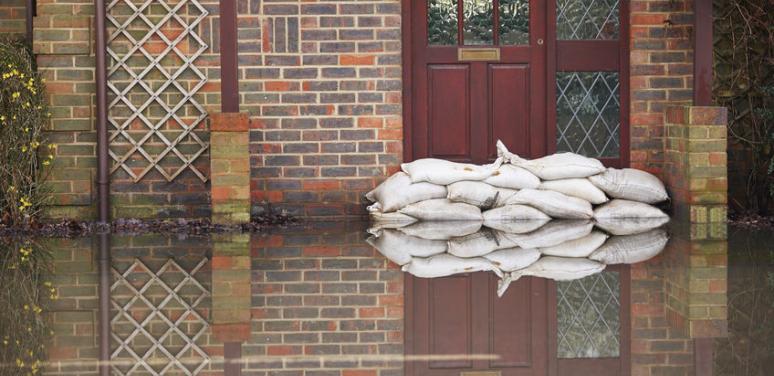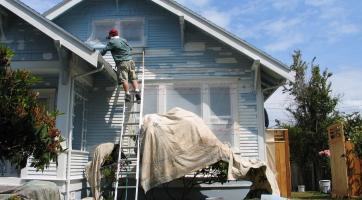Government and Nonprofit Roles in Natural Disaster Assistance

Government and Nonprofit Organizations Roles in Major Natural Disaster Assistance in Missouri
When a natural disaster, such as flooding or tornados occur in Missouri and the President of the United States makes a major disaster declaration, the following governmental agencies and nonprofit organizations are available to assist the survivors of the disaster.
Roles of the Federal Government
Federal Emergency Management Agency (FEMA)
A major disaster is declared upon request from the Governor of Missouri to the President of the United States based on a natural disaster. It is up to the President to make the declaration of a major disaster in Missouri. When the President of the United States declares a major disaster, federal assistance is made available to supplement the efforts and resources of state and local governments and voluntary relief organizations pursuant to the Robert T. Stafford Disaster Relief and Emergency Assistance Act (the Stafford Act), found at 42 USC 5121.
If you click on any link on this page you will be leaving this website.
It is important to note that a declaration that authorizes Public Assistance (PA), primarily assists jurisdictions in repairing infrastructure and public works, and is a separate program from Individual Assistance (IA). Individual Assistance assists affected individuals. For more information on PA and IA programs, please visit http://www.fema.gov.
Individuals, families, and businesses in disaster-affected counties may be eligible for federal assistance if a disaster declaration is made. It is essential to register with FEMA to ensure access to all available assistance. You may register with FEMA and apply for disaster assistance by calling the FEMA Helpline at 1-800-621-3362 (TTY: 1-800-462-7585) or by visiting http://www.fema.gov.
Disaster survivors should read FEMA’s Applicant Guide, titled “Help after a Disaster: Applicant’s Guide to the Individuals and Households Program.” You will be mailed a copy of this publication after registering with FEMA.
Roles of the State Government and Other Partners
Missouri State Emergency Management Agency (SEMA)
SEMA's mission is to protect the lives and property of all Missourians when major disasters threaten public safety in any city, county or region of Missouri. SEMA responds to two types of disasters - natural and those caused by man. Natural disasters are major snow and/or ice storms, floods, tornadoes and/or severe weather, as well as a potential major earthquake along Missouri's New Madrid Fault. Man-made disasters, also known as technological emergencies, may include hazardous material incidents, nuclear power plant accidents and other radiological hazards. SEMA is also responsible for developing a State Emergency Operations Plan which coordinates the actions of Missouri state government departments and agencies in the event of any emergency requiring the use of state resources and personnel. SEMA also serves as the statewide coordinator for activities associated with the National Flood Insurance Program.
The human services section of the Missouri State Emergency Management Agency (SEMA) encourages collaboration and coordination among all partners assisting Missourians during all phases of emergency management.
Governor's Faith-Based and Community Partnership for Disaster Recovery
Through Executive Order 09-25, the Governor’s Faith-based and Community Service Partnership for Disaster Recovery (The Partnership) is charged to; develop and maintain operating protocols for the Partnership; serve as the coordinating organization in concert with the State Emergency Management Agency for emergency human services functions in natural disasters and terrorist events; provide a forum to enable collaborative organizations such as the Missouri Voluntary Organizations Active in Disaster (MOVOAD) and Missouri Interfaith Disaster Response Organization (MIDRO) to best serve Missourians in time of emergency; assure the responsiveness of public and private sector resources to citizens in time of disaster; improve the human services disaster response and recovery delivery methods with a goal of increasing service to the citizens of Missouri while maximizing the use of public and private sector resources; develop and maintain an effective response and recovery plan which includes those Missourians with access and/or functional needs, with or without disabilities; function as the State Citizen Council for the State of Missouri, with support to the Homeland Security Advisory Council on post-disaster human service issues; and develop and propose to the Governor’s office, viable plans for funding recovery efforts in disasters that are undeclared, and to assist Missourians who are underserved in declared disasters.
The Partnership has created the Legal Help in Disasters Committee (LEHDCOM) to address the legal services needs of disaster survivors.
LEHDCOM member organizations include, but is not limited to:
Missouri Court of Appeals, Eastern District, St. Louis Missouri
The Missouri Bar, Jefferson City, Missouri
Legal Aid of Eastern Missouri, St. Louis, Missouri
Legal Services of Southern Missouri, Springfield, Missouri
Legal Aid of Western Missouri, Kansas City, Missouri
Mid-Missouri Legal Services, Columbia, Missouri
Missouri Association of Trial Attorneys (MATA), Jefferson City, Missouri
Office of the Attorney General, Jefferson City, Missouri
Samaritan Center Legal Care, Jefferson City, Missouri
Shook Hardy Bacon, Kansas City, Missouri
Bollwerk, Ryan & Tatlow, LLC, St. Louis Missouri
Barton, Barnum, Pennick & Barton, LLC, Webb City, Missouri
Larsen, Feist & Hess, P.C., St. Louis, Missouri
Martin Law Office, P.C., Joplin, Missouri
Law Offices of Joseph Morrey, St. Joseph, Missouri
Starke Law Offices, Blue Springs, Missouri
Missouri State Emergency Management Agency (SEMA), Jefferson City, Missouri
Federal Emergency Management Agency (FEMA) Region VII, Kansas City, Missouri
American Red Cross, Missouri North Central Division
Governor’s Faith-Based & Community Service Partnership for Disaster Recovery, Springfield, Missouri
City of Independence, Independence, Missouri
Department of Insurance, Financial Institutions and Professional Registration, Jefferson City
Lutheran Family and Children’s Services, St. Louis, Missouri
Department of Insurance, Financial Institutions and Professional Registration, Jefferson City, Missouri
LEHDCOM operates in all four phases of the emergency management cycle:
a. Mitigation
b. Preparedness
c. Response
d. Recovery
1. Mitigation: LEHDCOM will undertake projects that reduce the legal risks to which disaster survivors are vulnerable and provide community disaster education to those who are vulnerable to potential legal consequences caused by disasters.
2. Preparedness: LEHDCOM will engage in the following preparedness activities.
a. Capacity and resource development
b. Planning
c. Training
d. Exercises
3. Response: LEHDCOM will respond during disasters.
a. The Partnership may activate the LEHDCOM to coordinate:
1. Needs expressed by Partnership and Missouri VOADs.
2. Needs expressed by affected communities.
3. Calls and information received by LEHDCOM members.
4. SEMA will coordinate with the LEHDCOM any leadership meetings.
4. Recovery: LEHDCOM will support legal help to disaster survivors during the recovery phase.
Direction and Control: During all phases of emergency management and especially during disasters, LEHDCOM will be directed by LEHDCOM leadership (either the appointed chair(s) or delegated coordinators. SEMA will provide technical advice and guidance. The Partnership will provide overall strategic direction.
Missouri Voluntary Organizations Active in Disaster (VOAD)
As a collaborating entity, the VOAD's role is to coordinate the planning efforts of voluntary organizations responding to, preparing for, recovering from, and mitigating against disaster. Experience has shown that member organizations provide more effective and less duplicative services through cooperative efforts than they would if they acted autonomously. Missouri VOAD, in particular, has proven to be very effective in coordinating a wide variety of voluntary organizations to collectively meet disaster needs. Besides coordination and cooperation, Missouri VOAD also focuses on communication, education, and improved legislation for disaster response and recovery.
Missouri Interfaith Disaster Response Organization (MIDRO)
MIDRO is a non-for-profit organization formed in 1993 to assist Missouri's faith communities to coordinate and collaborate in responding to disasters- especially in long-term recovery efforts. MIDRO is not a substitute for nor in competition with efforts of denominations, associations or other religious groups. By working together we reduce duplication, exercise better stewardship of resources, and help to provide documented evidence for grant applications and continuous funding justifications.
Disaster Case Management
Through partnerships with local and state emergency management, The Partnership, MO VOAD, and MIDRO, many organizations throughout Missouri focus their efforts on long-term recovery, specifically through participation in Long-Term Recovery Groups (LTRGs) and disaster case management (DCM) services.
DCM is a time-limited process by which a skilled recovery specialist – a Disaster Case Manager – partners with a disaster-affected individual or household in order to plan for and achieve realistic goals for disaster recovery. This comprehensive and holistic approach to recovery extends beyond providing relief, providing a service, or meeting urgent needs. The overarching goal of DCM is to assist individuals and households in recovering to a reasonable level of self-sustainability through the development of a holistic recovery plan.
Roles of the Missouri Legal Disaster Assistance (MLDA)
Legal Aid Programs in Missouri
Legal Aid programs in Missouri will accept applications for emergency assistance that may include: bankruptcy, civil rights, employment law, family law, Federal Emergency Management Agency (FEMA) benefits claims, insurance law, landlord-tenant law, real estate law, consumer fraud and scams, as well as wills, trusts, and probate matters. During the initial assessment of your legal issues, you may also qualify for other legal assistance not related to the major disaster.
Survivors may call the legal aid program in your area to complete an application. If one of the Missouri legal aid programs cannot assist you, you may be referred to FEMA, SEMA, private bar referral services or other disaster organizations.
Multi-Agency Resource Center (MARC)
Multi-Agency Resource Center (MARC) sites are setup in various locations throughout the disaster area through coordination of the Missouri State Emergency Management Agency (SEMA) and the American Red Cross. Normally, a local legal aid staff attorney or volunteer private attorney will be available to assess your potential legal problems. Other volunteer agencies will be available to assist with other problems, such as, food, clothing and shelter. MARC site locations will be publicized on tv, radio or newspapers.
The Missouri Bar Young Lawyers Section
If FEMA determines that legal assistance is needed to individuals harmed by the major disaster, they will notify the American Bar Association (ABA) to notify The Missouri Bar Young Lawyers Section to implement their disaster plan.
The Missouri Bar Young Lawyers Section (MBYLS) will set up a toll-free hotline to provide individuals a direct connection to free legal assistance. All calls made to the hotline are forwarded to attorneys who can provide over-the-phone assistance, and when needed, callers will be referred to lawyers who have volunteered to provide legal representation free of charge. You can view the "ABA YLD Legal Services Manual, Prepared for Lawyers of the Missouri Bar” at the bottom of this page. The document is in Adobe pdf format.
Prepared by Sheldon W. Lackey, Missouri Legal Aid Statewide Web Committee - March 18, 2018
